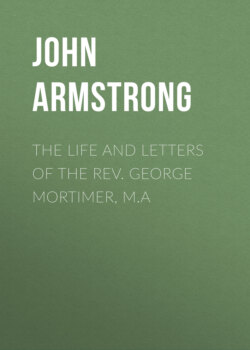Читать книгу The Life and Letters of the Rev. George Mortimer, M.A - John Armstrong - Страница 24
TO THE REV. J. ARMSTRONG.
ОглавлениеWellington, Sept. 1, 1814.
My very dear Friend,
I feel thankful that a day of comparative leisure enables me to fulfil my engagement as to writing to you. It is the Lord’s goodness; and I cannot help considering it as one out of many thousand other instances in which prayer and simple reliance upon God tend most effectually to forward us in our concerns. I fear to trust my own unstable and treacherous heart, and therefore begged of God that he would graciously assist me; and, were I to do so constantly, how much better would it be for me! how many good plans and well concerted schemes, instead of being rendered abortive, would have been sped and prospered! But, trusting in the goodness of the plan, instead of the blessing of the Lord, and, at the same time, overlooking my own utter insufficiency, I have been manifestly left to learn lessons of dependence, through the unwelcome medium of failure and disappointment. But, after all the pains which a gracious God has been pleased to take with me, how slow I am to learn, how unwilling to become nothing, that God may become all in all. And yet this is the only way in which we can be either extensively or permanently blessed. We are dealt with as children; but on which of his children will a judiciously affectionate parent bestow the greatest honour? Not on the forward and self-sufficient. This is a spirit which he must chasten and subdue by patient and humiliating discipline. It is the child who is modest, distrustful, and unassuming, who is diffident of his abilities, and afraid of leaning to his own understanding, that will meet with the countenance and support of the wise and tender father. But to one of a contrary temper, such a mode of treatment would be ruinous, and, therefore, utterly inadmissible on the part of a parent whose affectionate heart was regulated by a sound and enlightened judgment. Ah, my dear friend, how often do we put it out of the power even of the tender Father of mercies to speed and prosper us! How much humiliating discipline are we incessantly courting by attempting to rob God of that glory which belongs to himself alone!
A few evenings ago I received a letter from my agent in town, giving me an account of some loss which I had lately sustained. I took my dear wife with me into my study, and falling on our knees, we prayed to the Lord to bring us into a ready acquiescence with his divine will, and to keep us from every the least feeling of dissatisfaction or expression of complaint. While engaged in prayer, those words, “God is love,” came with sweet power to my mind. I felt convinced that it was that divine attribute, and that alone, which had appointed the circumstance; that I could not have done so well without as with it; and, consequently, that I had far more reason for gratitude and praise than for anything else. Since that time how clearly have I seen that the love of God is the only proper key to unlock all God’s dispensations, and that when this is used it will open to us treasures of mercies and of blessings which would otherwise be for ever closed from our view. The Lord teach me for the future to profit by the instruction; and enable us to label, as it were, each passing trial with some such inscription as this, “From your loving Father.”
You, my dear friend, have had much to bear; and perhaps Satan has whispered at times into your mind those considerations which are likely to distress and to discourage you; but all is well; all originates in love; and, therefore, as Parnell so sweetly teaches, “Where you can’t unravel,” “you should learn to trust.”
I hope you feel confidence in these blessed results of your labours. What a word is that of our gracious Redeemer’s, and how worthy to be graven on the palms of every minister of his truth! “Said I not unto thee, if thou wouldst believe thou shouldst see the glory of God?” Surely it is nothing but our unbelief which hinders the Lord from laying bare his arm, and doing wondrous things in righteousness. In our parish and neighbourhood we have lately seen a far more extensive work both of conversion and progression than we have ever yet been indulged with; and I cannot but ascribe it to the many prayers which have been recently offered up in reference to this point. Many of us have felt great confidence that the Lord would revive his work among us; and he who has taught us daily to pray that his kingdom might come, has in no way disappointed our hope. We trust, however, that what we have hitherto seen are merely the drops before the shower.
Mary and King unite with me in kindest love to yourself and dear Mrs. A., and I remain,
Your ever sincere and truly affectionate Friend,
George Mortimer.
Mr. Mortimer, from his early connexion with the Methodists, imbibed many of their views, and followed out some of their practices. I cannot say that he succeeded in convincing me of the expediency of the plan described in the following letter, though possessed probably of some advantages; nor do I think that he continued always to approve of the same; but I think it right that he should speak for himself, and therefore I shall give several copies or extracts of his letters on the subject:—
